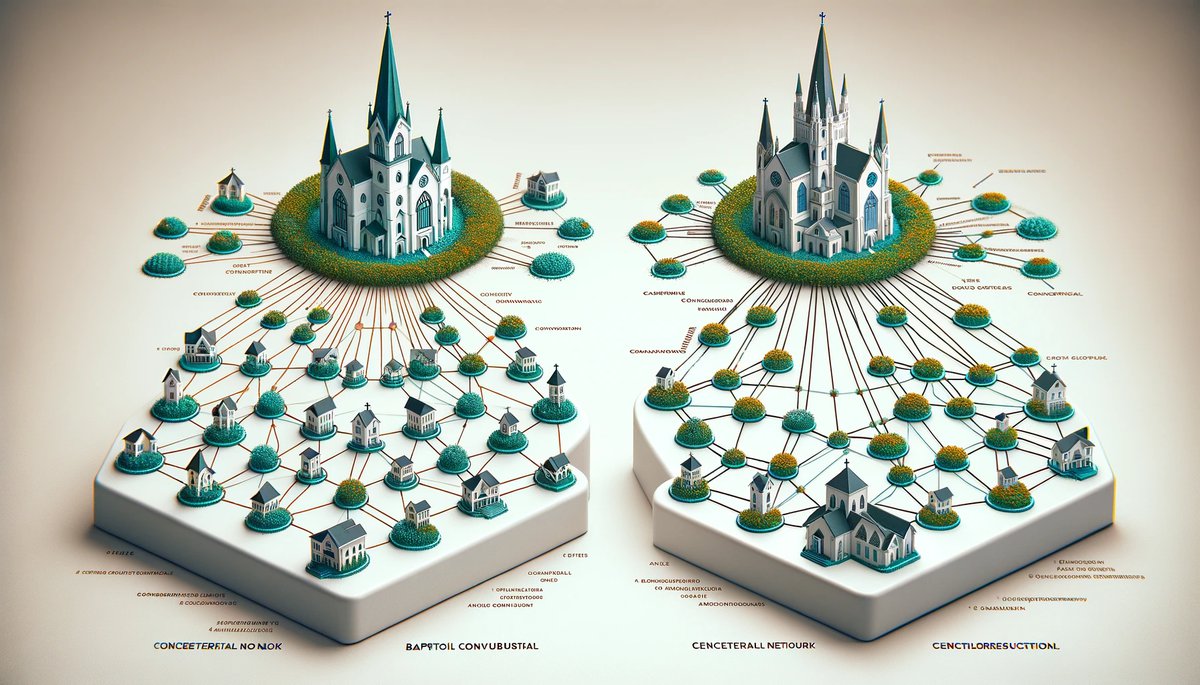Home>Theology and Spirituality>What Is The Difference Between Baptist And Non Denominational


Theology and Spirituality
What Is The Difference Between Baptist And Non Denominational
Published: February 23, 2024
Ericka Andersen, an editor at Christian.net, expertly merges digital strategy with content creation, focusing on faith and societal issues. Her communication skills enhance the platform's engaging narratives, fostering meaningful dialogue on belief's impact on society.
Discover the key distinctions between Baptist and non-denominational beliefs, practices, and traditions in the realm of theology and spirituality. Explore the unique characteristics that set these two religious affiliations apart.
(Many of the links in this article redirect to a specific reviewed product. Your purchase of these products through affiliate links helps to generate commission for Christian.net, at no extra cost. Learn more)
Table of Contents
Introduction
The world of Christianity is rich and diverse, encompassing a wide array of beliefs, practices, and denominations. Among the many branches of Christianity, Baptist and non-denominational churches stand out as significant movements with distinct characteristics and theological perspectives. Understanding the differences between these two expressions of faith can provide valuable insights into the multifaceted tapestry of Christian traditions.
Baptist and non-denominational churches represent two distinct approaches to Christian worship and community. While both share a commitment to following Jesus Christ and the teachings of the Bible, they diverge in their organizational structures, theological emphases, and views on certain religious practices. Exploring these differences can shed light on the nuances that shape the identities of these Christian communities.
In the following sections, we will delve into the beliefs, practices, and organizational frameworks of Baptist and non-denominational churches, offering a comprehensive comparison of their theological stances, church structures, and relationships with other Christian traditions. By examining these aspects, we aim to provide a deeper understanding of the unique characteristics that define Baptist and non-denominational Christianity, ultimately fostering greater appreciation for the diverse expressions of faith within the Christian landscape.
Beliefs and Practices of Baptists
Baptists are known for their distinctive beliefs and practices, which are deeply rooted in their interpretation of the Bible and their historical heritage. Central to Baptist theology is the belief in the authority of Scripture, emphasizing the Bible as the ultimate guide for faith and practice. This commitment to the primacy of the Bible shapes many aspects of Baptist beliefs and practices.
One of the hallmark beliefs of Baptists is the concept of believer's baptism, which underscores the practice of baptizing individuals who have made a personal profession of faith in Jesus Christ. This contrasts with infant baptism practiced in some other Christian traditions, as Baptists emphasize the importance of a conscious decision to follow Christ before undergoing baptism. This belief reflects their commitment to the autonomy of the individual believer and the priesthood of all believers, highlighting the personal responsibility and agency of each follower of Christ.
Furthermore, Baptists uphold the principle of congregational governance, wherein each local church is autonomous and self-governing. This means that decisions regarding church leadership, doctrine, and practices are made by the congregation, often through a democratic process involving the participation of church members. This emphasis on congregational autonomy is a defining feature of Baptist polity and reflects their commitment to local church independence and self-governance.
In terms of worship practices, Baptists typically prioritize the preaching of the Word, viewing the sermon as a central component of their worship services. The proclamation of the Gospel and the exposition of biblical teachings hold significant importance in Baptist worship, reflecting their dedication to the study and application of Scripture in the life of the church.
Additionally, Baptists place a strong emphasis on evangelism and missions, viewing the spread of the Gospel and the conversion of individuals as essential aspects of their faith. This emphasis on sharing the message of salvation aligns with their commitment to individual faith and personal conversion experiences.
Overall, the beliefs and practices of Baptists are characterized by a deep reverence for the authority of Scripture, a focus on believer's baptism, a commitment to congregational autonomy, an emphasis on biblical preaching, and a dedication to evangelism and missions. These core elements shape the identity of Baptist churches and contribute to their distinct theological and ecclesiological framework.
Beliefs and Practices of Non-Denominational Christians
Non-denominational Christians, often referred to as "non-denoms," represent a diverse and dynamic segment of the Christian community. What sets non-denominational Christianity apart is its emphasis on a non-traditional, independent approach to faith, unbound by the structures and doctrines associated with specific denominations. This approach is characterized by a focus on core biblical teachings and a desire to transcend denominational boundaries in favor of a more personal and direct relationship with God.
At the heart of non-denominational Christianity is a commitment to the authority and infallibility of the Bible. Non-denominational churches prioritize the study and application of Scripture, seeking to understand and live out the teachings of the Bible in a relevant and impactful manner. This emphasis on biblical truth serves as a unifying force within non-denominational communities, guiding their beliefs and practices.
Non-denominational Christians often embrace a contemporary and expressive style of worship, incorporating modern music, multimedia presentations, and participatory forms of worship. This approach reflects a desire to engage congregants in a meaningful and relevant worship experience while fostering a sense of community and spiritual connection.
In terms of governance and leadership, non-denominational churches typically exhibit a flexible and decentralized structure. While some may have a hierarchical leadership model, many non-denominational congregations prioritize a more egalitarian and collaborative approach to leadership, often led by a team of pastors or elders. This fluidity in leadership structure allows non-denominational churches to adapt to the evolving needs of their congregations and communities.
Non-denominational Christians often place a strong emphasis on the spiritual gifts and the empowering presence of the Holy Spirit in the life of the church. This emphasis on spiritual gifts, such as prophecy, healing, and speaking in tongues, reflects a belief in the ongoing work of the Holy Spirit and the active involvement of God in the lives of believers.
Furthermore, non-denominational churches tend to prioritize outreach and community engagement, seeking to impact their local communities and beyond through acts of service, social justice initiatives, and evangelistic efforts. This outward-focused approach aligns with their commitment to embodying the love and compassion of Christ in tangible ways.
Overall, non-denominational Christianity is characterized by a commitment to biblical authority, a contemporary approach to worship, a flexible leadership structure, an emphasis on spiritual gifts, and a dedication to community outreach. These distinctive beliefs and practices shape the identity of non-denominational churches and contribute to their vibrant and diverse expression of the Christian faith.
Differences in Church Structure and Leadership
The differences in church structure and leadership between Baptist and non-denominational churches are reflective of their distinct organizational frameworks and approaches to governance. These variances encompass aspects such as leadership roles, decision-making processes, and the overall hierarchical structure within the church community.
Baptist churches typically adhere to a congregational governance model, emphasizing the autonomy and self-governance of individual congregations. This means that each local Baptist church operates independently, with decisions regarding leadership, doctrine, and practices being made by the congregation itself. The congregation often plays a pivotal role in the selection of pastors and church leaders, and major decisions are typically put to a vote among church members. This democratic approach to church governance underscores the Baptist commitment to local autonomy and the active participation of the congregation in shaping the direction of the church.
In contrast, non-denominational churches often exhibit a more flexible and decentralized leadership structure. While some non-denominational congregations may have a hierarchical leadership model with designated pastors or elders, many embrace a collaborative leadership approach characterized by a team of leaders sharing responsibilities. This fluidity in leadership allows non-denominational churches to adapt to the evolving needs of their congregations and communities, fostering a sense of shared leadership and collective decision-making.
Furthermore, the role of denominational hierarchy differs between Baptist and non-denominational churches. Baptists are typically associated with denominational structures that provide varying degrees of oversight and support to individual churches. These denominational affiliations may offer resources, training, and organizational assistance to member churches, contributing to a sense of interconnectedness within the denomination. Non-denominational churches, on the other hand, operate independently of traditional denominational structures, often emphasizing a more organic and self-directed approach to church leadership and administration.
The differences in church structure and leadership between Baptist and non-denominational churches reflect their respective commitments to congregational autonomy, collaborative leadership, and the role of denominational affiliations. These distinctions contribute to the unique organizational identities of Baptist and non-denominational churches, shaping the dynamics of leadership, decision-making, and community engagement within each tradition.
Views on Baptism and Communion
Baptism and communion, also known as the Lord's Supper or the Eucharist, hold significant theological and symbolic importance within Christian traditions. The perspectives and practices surrounding these sacraments vary between Baptist and non-denominational churches, reflecting distinct theological emphases and ritual observances.
In the Baptist tradition, baptism is viewed as a symbolic act that signifies a believer's identification with the death, burial, and resurrection of Jesus Christ. This understanding is rooted in the concept of believer's baptism, which emphasizes the voluntary profession of faith as a prerequisite for undergoing baptism. Baptists typically practice baptism by immersion, symbolizing the cleansing of sin and the believer's union with Christ in His death and resurrection. The act of baptism is seen as a public declaration of one's faith and a pivotal step in the believer's spiritual journey. Additionally, Baptists generally do not ascribe salvific efficacy to baptism, viewing it as an outward expression of an inward transformation rather than a means of obtaining salvation.
In non-denominational churches, the views on baptism may exhibit greater diversity due to the decentralized nature of these communities. While some non-denominational churches align with believer's baptism and immersion practices akin to Baptists, others may adopt varied approaches, such as affusion (pouring) or aspersion (sprinkling), reflecting a spectrum of theological interpretations and individual convictions. Non-denominational churches often prioritize the spiritual significance of baptism as a symbol of rebirth and spiritual cleansing, emphasizing the believer's personal commitment to Christ and the community of faith.
Regarding communion, Baptists typically observe the Lord's Supper as a symbolic memorial of Christ's sacrificial death and the redemptive significance of His body and blood. The focus is on remembrance and spiritual reflection, with an emphasis on the symbolic elements of bread and grape juice representing the body and blood of Christ. The observance of communion is often characterized by a sense of solemnity and reverence, underscoring the central role of Christ's atoning work in the life of the believer and the community of faith.
In non-denominational churches, the practice of communion may encompass a range of expressions, reflecting the diversity and autonomy inherent in these communities. Some non-denominational churches may adopt a similar symbolic approach to communion as Baptists, emphasizing the memorial aspect and the spiritual significance of partaking in the Lord's Supper. Others may incorporate elements of celebration and thanksgiving, fostering a more participatory and communal experience during the observance of communion.
Overall, while both Baptist and non-denominational churches uphold the significance of baptism and communion as integral aspects of Christian faith and worship, the specific views, practices, and interpretations surrounding these sacraments may vary, reflecting the theological diversity and individual convictions within each tradition.
Relationship with Other Christian Churches
The relationship between Baptist and non-denominational churches and other Christian denominations is influenced by their distinct theological perspectives, ecclesiastical structures, and historical contexts. Both Baptist and non-denominational communities navigate their interactions with other Christian churches based on their respective beliefs, practices, and approaches to Christian unity.
Baptist churches historically maintain a strong sense of denominational identity while engaging in ecumenical dialogues and collaborative efforts with other Christian traditions. While upholding their distinctive theological convictions, Baptists often participate in interdenominational initiatives, cooperative ministries, and ecumenical gatherings that promote unity and shared mission within the broader Christian community. This engagement reflects a commitment to fostering relationships with other Christian churches while preserving the autonomy and distinctiveness of Baptist congregations.
Non-denominational churches, characterized by their independent and non-traditional approach to faith, often exhibit a diverse range of interactions with other Christian denominations. Some non-denominational communities prioritize collaboration and partnership with various Christian traditions, participating in interchurch events, joint outreach programs, and ecumenical endeavors. Others may emphasize a more insular or self-contained approach, focusing on the unique expression of their faith without extensive formal affiliations with specific denominations.
Both Baptist and non-denominational churches navigate the complexities of interchurch relationships while seeking to uphold their core beliefs and practices. While some may actively pursue interdenominational cooperation and dialogue, others may prioritize the distinctiveness of their theological perspectives and ecclesiastical autonomy. The dynamics of these relationships are shaped by a multitude of factors, including theological compatibility, shared mission objectives, and the desire to promote Christian unity amidst diversity.
In summary, the relationship between Baptist and non-denominational churches and other Christian denominations is characterized by a spectrum of engagements, ranging from active collaboration and ecumenical participation to a more independent and self-contained approach. These interactions reflect the diverse expressions of Christian unity and cooperation within the broader landscape of the Christian faith, highlighting the complexities and nuances of interchurch relationships in the contemporary religious milieu.
Conclusion
In conclusion, the comparison between Baptist and non-denominational Christianity reveals a tapestry of theological nuances, ecclesiastical dynamics, and relational intricacies that shape the identities of these two distinct expressions of faith. The beliefs and practices of Baptists, anchored in the authority of Scripture, believer's baptism, and congregational autonomy, underscore a deep commitment to biblical fidelity and individual faith. On the other hand, non-denominational Christianity, characterized by its emphasis on biblical truth, contemporary worship, and flexible leadership, reflects a diverse and adaptable approach to Christian faith and community.
The differences in church structure and leadership highlight the unique organizational frameworks of Baptist and non-denominational churches, showcasing their respective commitments to congregational autonomy and collaborative leadership. Views on baptism and communion further illustrate the theological diversity within these traditions, emphasizing the symbolic significance of these sacraments while allowing for variations in interpretation and practice. Additionally, the relationships with other Christian churches demonstrate the complex interplay between denominational identity, ecumenical engagement, and the pursuit of Christian unity amidst diversity.
Ultimately, the comparison between Baptist and non-denominational Christianity serves as a testament to the rich tapestry of Christian traditions, each contributing its unique hues to the broader landscape of the faith. While distinct in their theological emphases and ecclesiastical structures, both Baptist and non-denominational churches embody a shared commitment to following Jesus Christ and upholding the teachings of the Bible. Their differences, rather than creating divisions, offer a mosaic of perspectives that enrich the collective journey of the Christian faith, fostering a deeper appreciation for the diverse expressions of belief and practice within the body of Christ.
As we navigate the complexities of denominational diversity and interchurch relationships, may we embrace the unity that transcends theological distinctions, recognizing the common thread of faith that binds us together as followers of Christ. In celebrating the distinctiveness of Baptist and non-denominational Christianity, let us also embrace the interconnectedness of the broader Christian community, honoring the diverse expressions of faith while affirming the shared foundation of love, grace, and the redemptive work of Jesus Christ.














